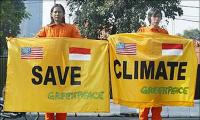Climate Finance: Developed Nations Push for Wider Contributor Base
Developed countries are pushing for a wider contributor base for climate finance, proposing that nations like China and Saudi Arabia contribute. Developing countries oppose the move, arguing it undermines equity and could stall COP29 negotiations.

New Delhi, Aug 20 (PTI) As the deadline to agree on a new climate finance goal nears, developed nations are pushing to expand the list of countries responsible for contributing funds to help developing countries address climate change, with Switzerland even proposing criteria to broaden the donor base.
Submissions made by some developed countries to the UNFCCC regarding negotiations on the New Collective Quantified Goal (NCQG) -- the new climate finance goal to be finalised in Baku, Azerbaijan in November -- suggest that wealthy nations might pressure countries with high emissions and high gross national income (GNI) per capita, such as Saudi Arabia, Russia, and China, to contribute.
Negotiators from developing countries say a discussion on broadening the climate finance contributor base goes far beyond the mandate for NCQG and could stall negotiations at COP29.
According to the 1992 United Nations Framework Convention on Climate Change (UNFCCC), high-income industrialised nations (referred to as Annex II countries) are responsible for providing finance and technology to help developing countries combat and adapt to climate change. These countries include the US, Canada, Japan, Australia, New Zealand, and European Union (EU) member states such as Germany, France and the UK.
Some developed countries, led by the EU and the US, argue that the global economic landscape has changed significantly since 1992.
They suggest that nations which have become wealthier during this period, like China and some Gulf states, should also contribute to the new climate finance goal.
Developing countries view this as an attempt to shift responsibility from those who have historically benefited from industrialisation and contributed the most to greenhouse gas emissions. They argue that expecting them to contribute, especially when many are still struggling with poverty and inadequate infrastructure, undermines the principle of equity.
In a submission to the UNFCCC last week, the European Commission said the "collective goal can only be reached if parties with high GHG emissions and economic capabilities join the effort."
The US said that while current contributors will continue to support developing countries, other nations with the "capacity to support others in pursuing mitigation and adaptation must also be accountable for delivering on the NCQG's support layer."
"Their contributions will also enable a larger quantum for the support layer of the NCQG," the US said, adding that contributing parties could be identified in various ways -- through a "definitional approach, a criteria-based approach, a de facto approach, or otherwise."
Switzerland proposed that in addition to developed countries, parties that are among the "10 largest current emitters and have a purchasing power parity-adjusted gross national income per capita of more than USD 22,000" should also contribute to the new climate finance goal.
This proposal puts the spotlight on countries such as Saudi Arabia, Russia, and China.
According to the Swiss proposal, countries with cumulative past and current emissions per capita of at least 250 tonnes of carbon dioxide equivalent and a purchasing power parity-adjusted gross national income per capita of more than USD 40,000 should also contribute.
Diego Pacheco, spokesperson for Like-Minded Developing Countries (LMDC) and lead negotiator for Bolivia, told PTI that developing countries were opposed to the idea of reopening and widening the contributors' base beyond the established framework of the UNFCCC and the Paris Agreement.
"This goes far beyond the mandates for discussing the NCQG. Developed countries should fulfil their financial commitments," he said.
Pacheco said the principles of equity and common but differentiated responsibilities should be central to the negotiations for formulating a meaningful NCQG.
Harjeet Singh, a climate activist and Global Engagement Director for the Fossil Fuel Non-Proliferation Treaty Initiative, said the attempt to shift responsibility risks stalling critical negotiations at COP29, leaving vulnerable communities to bear the brunt of catastrophic climate impacts.
He said that increasing pressure to expand the contributor base for climate finance undermines the core principles of the UN climate convention and the Paris Agreement, which clearly place the primary responsibility on historically industrialised nations.
"While the new proposals acknowledge the cumulative emissions and per capita income of countries, they conveniently overlook the decades of inaction by wealthy nations that have drastically increased the need for climate finance," Singh said.
Sehr Raheja, a programme officer at the Delhi-based think tank Centre for Science and Environment, said that discussions on who should contribute and which countries should be considered developed will require a lot of time, as these questions are "very complicated and technical," while countries will reach the deadline for the NCQG in November.
Raheja said if developed countries push to discuss this now, it might derail the NCQG negotiations and prevent them from reaching a fair and timely agreement.
She stressed that it is more important to prioritise the establishment of a mechanism to ensure that funds actually reach developing countries, given the track record on commitments by wealthier nations so far, rather than getting stuck on who should contribute.
Submissions made by some developed countries to the UNFCCC regarding negotiations on the New Collective Quantified Goal (NCQG) -- the new climate finance goal to be finalised in Baku, Azerbaijan in November -- suggest that wealthy nations might pressure countries with high emissions and high gross national income (GNI) per capita, such as Saudi Arabia, Russia, and China, to contribute.
Negotiators from developing countries say a discussion on broadening the climate finance contributor base goes far beyond the mandate for NCQG and could stall negotiations at COP29.
According to the 1992 United Nations Framework Convention on Climate Change (UNFCCC), high-income industrialised nations (referred to as Annex II countries) are responsible for providing finance and technology to help developing countries combat and adapt to climate change. These countries include the US, Canada, Japan, Australia, New Zealand, and European Union (EU) member states such as Germany, France and the UK.
Some developed countries, led by the EU and the US, argue that the global economic landscape has changed significantly since 1992.
They suggest that nations which have become wealthier during this period, like China and some Gulf states, should also contribute to the new climate finance goal.
Developing countries view this as an attempt to shift responsibility from those who have historically benefited from industrialisation and contributed the most to greenhouse gas emissions. They argue that expecting them to contribute, especially when many are still struggling with poverty and inadequate infrastructure, undermines the principle of equity.
In a submission to the UNFCCC last week, the European Commission said the "collective goal can only be reached if parties with high GHG emissions and economic capabilities join the effort."
The US said that while current contributors will continue to support developing countries, other nations with the "capacity to support others in pursuing mitigation and adaptation must also be accountable for delivering on the NCQG's support layer."
"Their contributions will also enable a larger quantum for the support layer of the NCQG," the US said, adding that contributing parties could be identified in various ways -- through a "definitional approach, a criteria-based approach, a de facto approach, or otherwise."
Switzerland proposed that in addition to developed countries, parties that are among the "10 largest current emitters and have a purchasing power parity-adjusted gross national income per capita of more than USD 22,000" should also contribute to the new climate finance goal.
This proposal puts the spotlight on countries such as Saudi Arabia, Russia, and China.
According to the Swiss proposal, countries with cumulative past and current emissions per capita of at least 250 tonnes of carbon dioxide equivalent and a purchasing power parity-adjusted gross national income per capita of more than USD 40,000 should also contribute.
Diego Pacheco, spokesperson for Like-Minded Developing Countries (LMDC) and lead negotiator for Bolivia, told PTI that developing countries were opposed to the idea of reopening and widening the contributors' base beyond the established framework of the UNFCCC and the Paris Agreement.
"This goes far beyond the mandates for discussing the NCQG. Developed countries should fulfil their financial commitments," he said.
Pacheco said the principles of equity and common but differentiated responsibilities should be central to the negotiations for formulating a meaningful NCQG.
Harjeet Singh, a climate activist and Global Engagement Director for the Fossil Fuel Non-Proliferation Treaty Initiative, said the attempt to shift responsibility risks stalling critical negotiations at COP29, leaving vulnerable communities to bear the brunt of catastrophic climate impacts.
He said that increasing pressure to expand the contributor base for climate finance undermines the core principles of the UN climate convention and the Paris Agreement, which clearly place the primary responsibility on historically industrialised nations.
"While the new proposals acknowledge the cumulative emissions and per capita income of countries, they conveniently overlook the decades of inaction by wealthy nations that have drastically increased the need for climate finance," Singh said.
Sehr Raheja, a programme officer at the Delhi-based think tank Centre for Science and Environment, said that discussions on who should contribute and which countries should be considered developed will require a lot of time, as these questions are "very complicated and technical," while countries will reach the deadline for the NCQG in November.
Raheja said if developed countries push to discuss this now, it might derail the NCQG negotiations and prevent them from reaching a fair and timely agreement.
She stressed that it is more important to prioritise the establishment of a mechanism to ensure that funds actually reach developing countries, given the track record on commitments by wealthier nations so far, rather than getting stuck on who should contribute.
You May Like To Read
TODAY'S MOST TRADED COMPANIES
- Company Name
- Price
- Volume
- Vodafone-Idea-L
- 11.65 (+ 3.56)
- 106772451
- Alstone-Textiles
- 0.28 ( -3.45)
- 44187760
- Mangalam-Industrial
- 0.88 ( -2.22)
- 39177573
- Sunshine-Capital
- 0.27 (+ 3.85)
- 35956340
- GMR-Airports
- 104.40 (+ 6.37)
- 30453005



